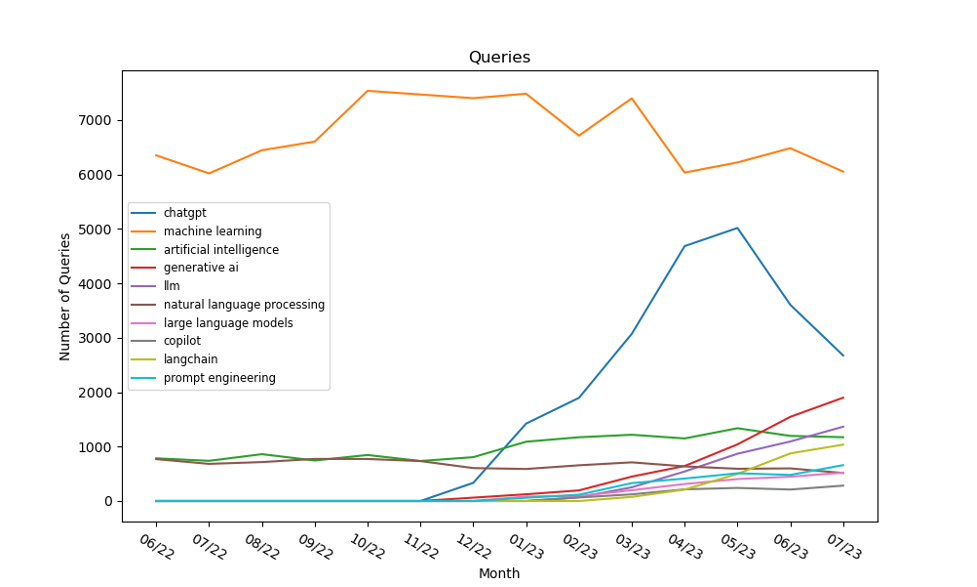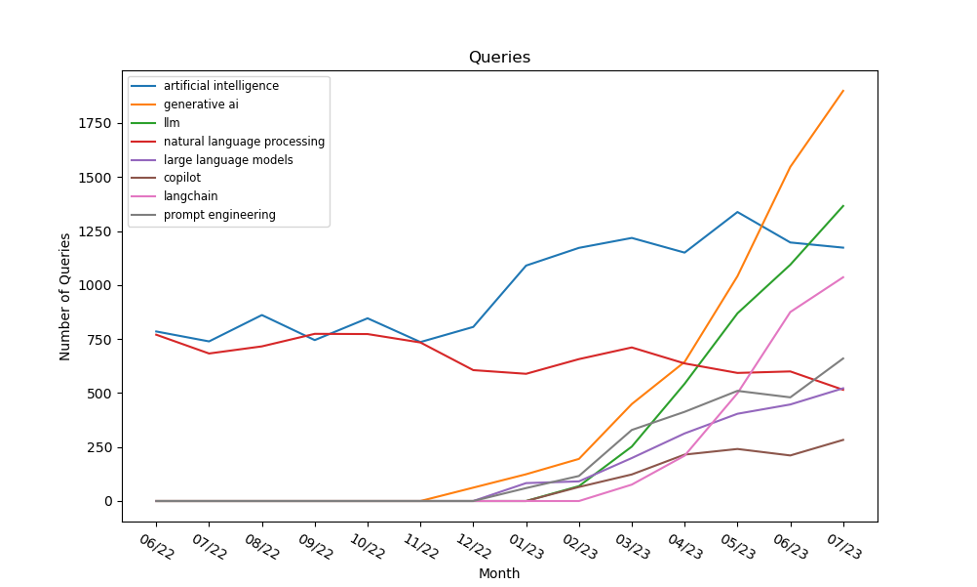I’m positive that no person will likely be stunned that the variety of searches for ChatGPT on the O’Reilly studying platform skyrocketed after its launch in November, 2022. It is perhaps a shock how rapidly it received to the highest of our charts: it peaked in Might because the sixth commonest search question. Then it dropped nearly as rapidly: it dropped again to #8 in June, and fell additional to #19 in July. At its peak, ChatGPT was in very unique firm: it’s not fairly on the extent of Python, Kubernetes, and Java, but it surely’s within the combine with AWS and React, and considerably forward of Docker.
A take a look at the variety of searches for phrases generally related to AI exhibits how dramatic this rise was:

ChatGPT got here from nowhere to prime all of the AI search phrases apart from Machine Studying itself, which is persistently our #3 search time period—and, regardless of ChatGPT’s dramatic decline in June and July, it’s nonetheless forward of all different search phrases related to AI. The variety of searches for Machine Studying itself held regular, although it arguably declined barely when ChatGPT appeared. What’s extra fascinating, although, is that the search time period “Generative AI” abruptly emerged from the pack because the third hottest search time period. If present traits proceed, in August we’d see extra searches for Generative AI than for ChatGPT.
What can we make of this? Everybody is aware of that ChatGPT had one of the crucial profitable launches of any software program mission, passing 1,000,000 customers in its first 5 days. (Since then, it’s been overwhelmed by Fb’s Threads, although that’s probably not a good comparability.) There are many causes for this surge. Speaking computer systems have been a science fiction dream since nicely earlier than Star Trek—by itself, that’s a very good motive for the general public’s fascination. ChatGPT would possibly simplify frequent duties, from doing analysis to writing essays to primary programming, so many individuals need to use it to avoid wasting labor—although getting it to do high quality work is harder than it appears at first look. (We’ll go away the difficulty of whether or not that is “dishonest” to the customers, their lecturers, and their employers.) And, whereas I’ve written steadily about how ChatGPT will change programming, it would undoubtedly have a good better impact on non-programmers. It would give them the prospect to inform computer systems what to do with out programming; it’s the last word “low code” expertise.
So there are many causes for ChatGPT to surge. What about different search phrases? It’s straightforward to dismiss these search queries as also-rans, however they had been all within the prime 300 for Might, 2023—and we sometimes have just a few million distinctive search phrases per thirty days. Eradicating ChatGPT and Machine Studying from the earlier graph makes it simpler to see traits within the different fashionable search phrases:

It’s principally “up and to the correct.” Three search phrases stand out: Generative AI, LLM, and Langchain all observe comparable curves: they begin off with comparatively average progress that abruptly turns into a lot steeper in February, 2023. We’ve already famous that the variety of searches for Generative AI elevated sharply because the launch of ChatGPT, and haven’t declined up to now two months. Our customers evidently choose LLM to spelling out “Massive Language Fashions,” however if you happen to add these two search phrases collectively, the entire variety of searches for July is inside 1% of Generative AI. This surge didn’t actually begin till final November, when it was spurred by the looks of ChatGPT—though search phrases like LLM had been already in circulation due to GPT-3, DALL-E, StableDiffusion, Midjourney, and different language-based generative AI instruments.
Not like LLMs, Langchain didn’t exist previous to ChatGPT—however as soon as it appeared, the variety of searches took off quickly, and didn’t decline in June and July. That is sensible; though it’s nonetheless early, Langchain seems like it will likely be the cornerstone of LLM-based software program growth. It’s a extensively used platform for constructing functions that generate queries programmatically and that connects LLMs with one another, with databases, and with different software program. Langchain is steadily used to search for related articles that weren’t in ChatGPT’s coaching information and bundle them as a part of a prolonged immediate.
On this group, the one search time period that appears to be in a decline is Pure Language Processing. Though giant language fashions clearly fall into the class of NLP, we suspect that the majority customers affiliate NLP with older approaches to constructing chatbots. Searches for Synthetic Intelligence seem like holding their very own, although it’s stunning that there are so few searches for AI in comparison with Machine Studying. The distinction stems from O’Reilly’s viewers, which is comparatively technical and prefers the extra exact time period Machine Studying. Nonetheless, the variety of searches for AI rose with the discharge of ChatGPT, probably as a result of ChatGPT’s enchantment wasn’t restricted to the technical group.
Now that we’ve run via the information, we’re left with the massive query: What occurred to ChatGPT? Why did it decline from roughly 5,000 searches to barely over 2,500 in a interval of two months? There are lots of attainable causes. Maybe college students stopped utilizing ChatGPT for homework assignments as commencement and summer time trip approached. Maybe ChatGPT has saturated the world; individuals know what they should know, and are ready for the following blockbuster. An article in Ars Technica notes that ChatGPT utilization declined from Might to June, and suggests many attainable causes, together with consideration to the Twitter/Threads drama and frustration as a result of OpenAI carried out stricter guardrails to stop abuse. It might be unlucky if ChatGPT utilization is declining as a result of individuals can’t use it to generate abusive content material, however that’s a unique article…
A extra necessary motive for this decline is perhaps that ChatGPT is not the one recreation on the town. There at the moment are many various language fashions. Most of those options descend from Meta’s LLaMA and Georgi Gerganov’s llama.cpp (which may run on laptops, cell telephones, and even Raspberry Pi). Customers can practice these fashions to do no matter they need. A few of these fashions have already got chat interfaces, and all of them may help chat interfaces with some pretty easy programming. None of those options generate important search site visitors at O’Reilly, however that doesn’t imply that they gained’t sooner or later, or that they aren’t an necessary a part of the ecosystem. Their proliferation is a crucial piece of proof about what’s taking place amongst O’Reilly’s customers. AI builders now have to ask a query that didn’t even exist final November: ought to they construct on giant basis fashions like ChatGPT or Google’s Bard, utilizing public APIs and paying by the token? Or ought to they begin with an open supply mannequin that may run domestically and be educated for his or her particular software?
This final rationalization makes a number of sense in context. We’ve moved past the preliminary part, when ChatGPT was an enchanting toy. We’re now constructing functions and incorporating language fashions into merchandise, so traits in search phrases have shifted accordingly. A developer occupied with constructing with giant language fashions wants extra context; studying about ChatGPT by itself isn’t sufficient. Builders who need to find out about language fashions want completely different varieties of data, data that’s each deeper and broader. They should find out about how generative AI works, about new LLMs, about programming with Langchain and different platforms. All of those search phrases elevated whereas ChatGPT declined. Now that there are alternatives, and now that everybody has had an opportunity to check out ChatGPT, step one in an AI mission isn’t to seek for ChatGPT. It’s to get a way of the panorama, to find the probabilities.
Searches for ChatGPT peaked rapidly, and at the moment are declining quickly—and who is aware of what August and September will deliver? (We wouldn’t be stunned to see ChatGPT bounce again as college students return to high school and homework assignments.) The actual information is that ChatGPT is not the entire story: you may’t take a look at the decline in ChatGPT with out additionally contemplating what else our customers are looking for as they begin constructing AI into different tasks. Massive language fashions are very clearly a part of the long run. They may change the way in which we work and reside, and we’re simply at the beginning of the revolution.


